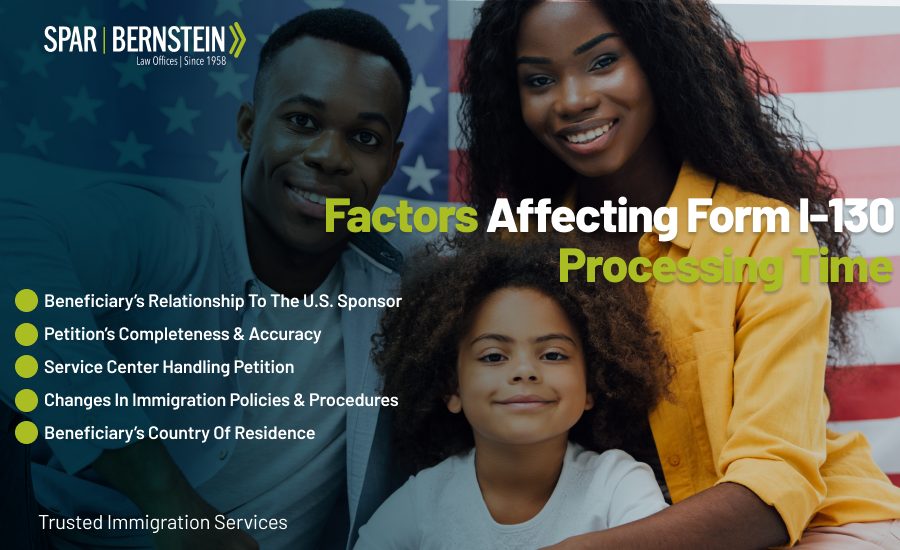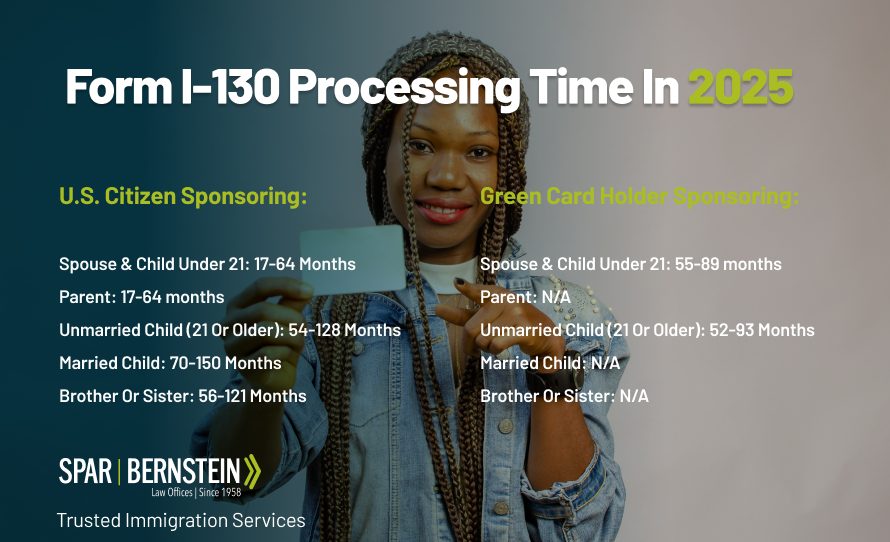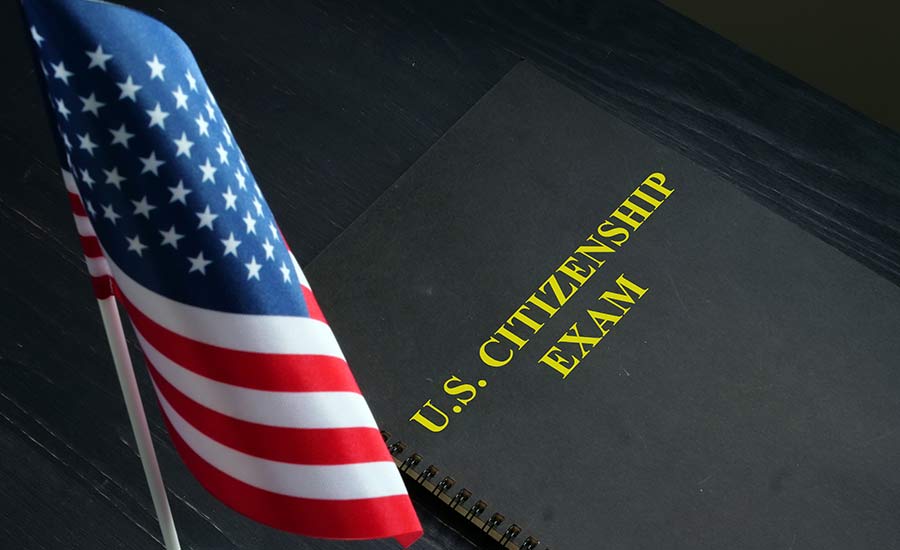

I-130 Processing Time: Key Points
- The timeline for processing Form I-130 depends on the immigration status and the Petitioner’s relationship to the Beneficiary
- U.S. citizens sponsoring a spouse or child under 21 years old may see processing times between 17 and 64 months, while Green Card holders sponsoring a spouse face longer wait times — between 55 and 89 months
- The time for processing I-130 for unmarried children who are 21 years old or older of U.S. citizens is between 54 and 128 months. For Green Card Petitioner’s unmarried children, it is 52 to 93 months
- Married children of U.S. citizens must wait between 70 and 150 months. Green Card holders are ineligible to sponsor married children for immigration to the U.S
- U.S. citizens are eligible to petition for a parent, and the wait time for Form I-130 is between 17 and 64 months, the same as for any immediate relative. Lawful permanent residents cannot petition for a parent
- I-130 processing time for siblings of U.S. citizens is 56 to 121 months, while Green Card holders cannot petition for brothers and sisters
- Filing Form I-130 doesn’t grant an immigrant visa immediately — it only starts the process of eligibility for one when a visa number becomes available
If you’re applying for a Green Card for a spouse, parent, or sibling—or planning to move to the U.S. as a relative of a citizen—you’ll first need to file Form I-130, the Petition for Alien Relative.
We’ll share:
- The processing times for Form I-130 for relatives of U.S. citizens and Green Card holders
- The factors that can affect the processing timeline
- How to check Form I-130 status
- How an experienced immigration lawyer can help in the Green Card process
I-130 Processing Time For A Spouse In 2025
The time for processing Form I-130 for a spouse depends on whether the petitioner is a U.S. citizen or a Green Card holder.
Spouses Of U.S. Citizens
For a spouse of a U.S. citizen, the average processing time for Form I-130 in 2025 takes between 17 and 64 months.
Spouses of U.S. citizens are considered immediate relatives.
There are no annual quota restrictions on the number of Green Cards for immediate relatives, which means a Green Card becomes available to the Petitioner right after the U.S. Citizenship and Immigration Services (USCIS) approves the petition.
If the spouse is already in the U.S., they may be eligible to adjust their status to a lawful permanent resident by submitting Form I-485, Application to Register Permanent Residence or Adjust Status concurrently with Form I-130.
Ask our immigration attorneys at Spar & Bernstein if concurrent filing is possible and/or permitted in your situation.
If the spouse is not in the U.S., upon approval by the USCIS, the petition will be forwarded to the National Visa Center.
The employees at the NVC will gather biometric information, financial records, police clearances and other evidence, and forward the application for consular processing to the U.S. Embassy in the country where the spouse resides.
Spouses Of Green Card Holders
Spouses of lawful permanent residents fall under the second family preference category, where there is a quota of 87,934 visas per fiscal year. They must wait for a visa to become available in this category to continue the process to apply for a Green card.
Whether a visa is available can be tracked in the Visa Bulletin of the National Visa Center (NVC), published monthly. The Bulletin contains information about the country of application, visa quota and the date for the specific visa type.
For a spouse of a U.S. lawful permanent resident, the processing time of Form I-130 takes between 55 and 89 months.
Because every case is different, some I-130 forms may take longer to adjudicate than others.
Typically, USCIS handles the cases in the order they are received. The quoted processing times are based on the time frame needed to complete 80% of the cases that were adjudicated in the previous six months.
I-130 petitions typically do not allow premium or expedited processing. USCIS will only consider expedited requests in cases of humanitarian urgency or U.S. government interest.
Our knowledgeable and compassionate immigration lawyers at Spar & Bernstein will review the details of your application and determine whether you are eligible to place an expedited request for Form I-130.
I-130 Processing Time For Unmarried Children 21 Or Older
Both U.S. citizens and lawful permanent residents are allowed to petition for their unmarried children who are over 21 years of age.
The processing time for Form I-130 for an unmarried child of a U.S. citizen who is 21 or older is between 54 and 128 months.
The processing time for the Form I-130 for an unmarried child of a U.S. lawful permanent resident who is 21 or older is between 52 and 93 months.
The annual quota per fiscal year for this category is 26,266 and a visa must be available to proceed with the Green Card or immigration visa application process.
I-130 Processing Time for Married Children of U.S. Citizens
U.S. citizens can file Form I-130 to petition for their married sons and daughters of any age.
This category falls under the Family Third Preference (F3). The processing time for Form I-130 petitions in this category can vary significantly based on the service center handling the case and the beneficiary’s country of origin.
The estimated processing time ranges from 70 to 150 months. It’s important to note that after USCIS approves the I-130 petition, Beneficiaries must wait for a visa number to become available, which can add additional years to the process due to annual numerical limits set by the U.S. Congress.
Green Card holders cannot petition for married children.
I-130 Processing Time For Parents In 2025
Parents of U.S. citizens are eligible to be sponsored for a Green Card as immediate relatives under the condition that the U.S resident is 21 or older.
The time it takes to process Form I-130 for a U.S. citizen’s parent is between 17 and 64 months — the same time frame as for other immediate relatives.
Lawful permanent residents cannot file I-130 for their parents.
I-130 Processing Time for Siblings of U.S. Citizens
U.S. citizens aged 21 or older may petition for their brothers and sisters by filing Form I-130.
However, siblings are not treated as immediate relatives — they fall under the F4 family preference category. This means that the siblings of a U.S citizen must wait until there is a visa available for them.
The estimated processing time for Form I-130 petitions for siblings ranges from 56 to 121 months, depending on the Beneficiary’s country of origin and the backlog of applications.
After USCIS approves the I-130 petition, siblings must wait for a visa number to become available, which is subject to annual numerical limits imposed by U.S. immigration law.
Lawful permanent residents cannot sponsor siblings for U.S. immigration.
Use the USCIS processing time tool to check the timeframe for your specific situation.

How To Check The Processing Time After Filing Form I-130
To check the processing time after filing Form I-130, visit the processing time section on USCIS website.
Fill in:
- The type of form
- The form category
- The field office where the petition was filed
If you have been waiting longer than the specified time range for your category, submit an electronic inquiry using:
- The receipt number
- The date of filing
- An email address
How to Expedite I-130 Processing
In certain situations, petitioners may request expedited processing of their Form I-130. USCIS considers expedite requests on a case-by-case basis and may grant them for reasons such as:
- Severe financial loss to a company or person, provided that the need for urgent action is not the result of the Petitioner’s failure to file the benefit request or respond to requests for additional evidence in a timely manner.
- Emergencies and urgent humanitarian reasons.
- A nonprofit organization whose request is in furtherance of the cultural and social interests of the United States.
- U.S. government interests (such as cases identified as urgent by federal agencies).
To request expedited processing, contact the USCIS Contact Center and be prepared to provide evidence supporting the expedite request.
It’s important to note that even if USCIS grants an expedite request, it does not guarantee immediate processing or approval of the petition.
Factors That Affect I-130 Processing Time
The factors that affect Form I-130 processing time include:
- The Beneficiary’s relationship to the U.S. sponsor — whether an immediate relative or a preference category family member
- Service center processing the petition: Different USCIS service centers have varying workloads and processing speeds, which can affect the time it takes to process Form I-130
- Completeness and accuracy of the petition: Submitting a well-prepared petition with all required supporting documents can prevent delays caused by Requests for Evidence (RFEs)
- Changes in immigration policies or procedures: Updates in immigration laws or USCIS policies can impact processing times.
- The Beneficiary’s country of residence at the time the petition is submitted — whether they are in the U.S or outside the country
- Details about the Petitioner and the Beneficiary, such as the immigration history of both parties
- Whether the USCIS requests additional evidence to support the petition
Working with a trusted attorney can help ensure that the form is filed correctly, and that approval is as quick and efficient as possible.
Since 1958, our immigration attorneys at The Law Offices of Spar & Bernstein have helped thousands of clients with family and employment immigration, citizenship and naturalization, asylum and refugee protection and similar immigration situations.
If you need to file Form I-130, contact our knowledgeable team to set up a consultation and we’ll explain how we can help.

I-130 Processing Time: Key Takeaways
- I-130 processing time for a spouse, child under 21, or parent of a U.S. citizen: 17-64 months
- I-130 processing time for spouse or child under 21 of Green Card holders: 55-89 months
- Green Card holders cannot petition for parents, siblings, and married children.
How Spar & Bernstein Can Help In The Green Card Process
Our knowledgeable and compassionate immigration attorneys at Spar & Bernstein will help you navigate the complex Green Card application process for your loved ones.
Often taking several years, the process requires precise paperwork and documentation to ensure approval.
We have extensive experience submitting Form I-130 on behalf of families wishing to bring their loved ones to America permanently. We complete all documentation with the utmost care and attention to detail to avoid delays or denials.
Our team will provide you with an estimated timeline for approval and advise you on whether the concurrent filing of additional Green Card applications is possible in your case, to speed up the overall process.
While waiting for the USCIS to process your form, our experienced attorneys will walk you through other areas of the Green Card process to help you understand Green Card benefits, the difference between a Green Card and a visa, and prepare you for your interviews, medical exams, and more.
Whether you are beginning the Green Card process for your spouse, parent, or sibling, our attorneys will be by your side every step of the way.
For more immigration insights, watch the Brad Show Live on weekdays from 6 to 8 p.m. EST, hosted by our Managing Partner, Brad Bernstein. During the show, Brad answers both immigration and personal injury questions submitted on social media and during live calls.
I-130 Processing Time: FAQs
Still have questions about I-130 processing time in 2025? Check out some of the most frequently asked questions in the section below.
Can I expedite the processing of my I-130 petition?
In certain situations, such as emergencies or critical need to travel for medical treatment, you might be able to request an expedited processing of your I-130 petition. The USCIS considers expedited processing requests on a case-by-case basis and has the sole discretion to grant or deny it.
Do the USCIS service centers have different processing times for Form I-130?
Yes, processing times can vary between USCIS service centers. Check the average processing times for the center where you filed your petition on the USCIS website.
Can I travel while my Form I-130 is pending?
Yes, you can travel while your I-130 is pending. However, it is important to maintain your legal status and comply with any visa restrictions that might apply. Schedule a consultation with our immigration attorneys at Spar & Bernstein if you have any concerns regarding possible travel restrictions in your case.
Can I upgrade my I-130 petition if my sponsor becomes a U.S. citizen during the processing period?
Yes, if your sponsor becomes a U.S. citizen during the processing period, you might be eligible for an upgrade to a faster preference category. Notify USCIS of the changes in your sponsor’s status.
Can I request a refund if my I-130 petition is not processed within the estimated time frame?
The USCIS does not refund filing fees, even if processing times exceed the estimates. The fees cover the cost of processing and are non-refundable.
Can I check Form I-130 processing times for different family-based preference categories?
Yes, USCIS provides average processing times for different family-based preference categories on their website. The preference category is based on the relationship between the Petitioner and the Beneficiary.
What is the difference between USCIS processing time and National Visa Center (NVC) processing time for Form I-130?
USCIS processing time refers to the time it takes for the initial approval of the I-130 petition. NVC processing time refers to the subsequent steps in the immigrant visa process, such as visa allocation and document collection.





